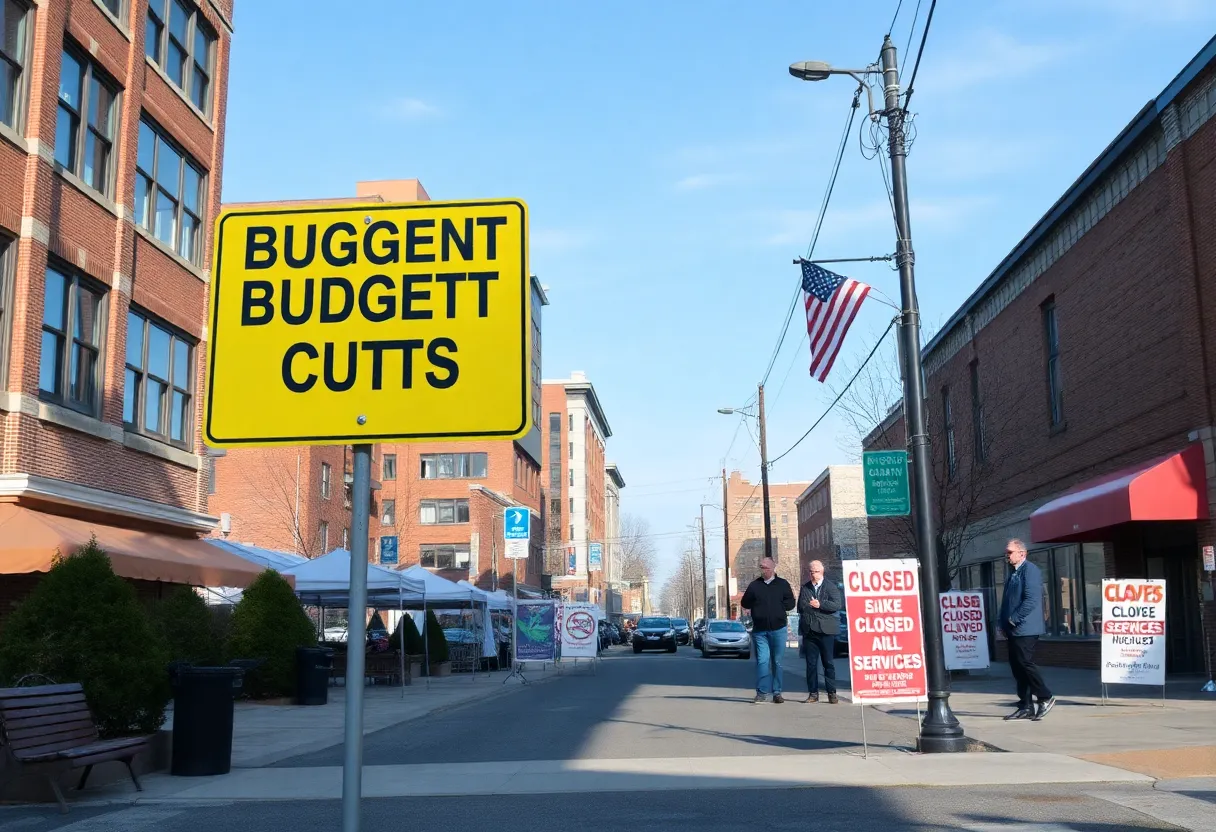Massachusetts, October 11, 2025
News Summary
Cities and towns in Massachusetts are grappling with rising costs and tight tax revenues that are leading to significant budget gaps. Local leaders report cuts to essential services, with communities like Newton and Milton facing particularly severe shortfalls. Discussions are underway regarding tax overrides and policy changes, as rising costs of living strain municipal budgets further. Several towns are set to vote on overrides in upcoming elections, reflecting deep concerns about financial sustainability and service delivery.
Newton
Communities in Massachusetts are facing increasing fiscal challenges, with no relief in sight as costs continue to rise and tax revenues remain tight. Municipal leaders across the state report widening budget gaps that are forcing cuts to essential services and prompting voters in some towns to consider rare and large overrides.
Key developments
Mayor Ruthanne Fuller of Newton reports widespread financial anxiety among city residents regarding rising costs of groceries, energy prices, and home insurance. Local officials say residents are feeling the strain of higher everyday costs while municipal budgets have limited capacity to respond.
The cost of paving in Newton has tripled over the past decade, leading to budget cuts in road maintenance. Rising material and labor costs have translated into delayed or reduced capital work in multiple municipalities.
A report by the Massachusetts Municipal Association describes a fiscal crisis affecting municipalities across the state due to a convergence of severe factors. The association’s analysis cites rising service costs, constrained revenue growth under current local tax rules, and the end of temporary federal supports as central contributors.
Municipalities are struggling to keep budgets balanced, resulting in cuts to essential services which impact schools, libraries, roads, and public safety. Towns and cities are reallocating limited dollars and evaluating difficult trade-offs to preserve core services.
Local impacts and notable cases
In Milton, the School Committee faces a $4 million deficit followed by an additional $2 million shortfall in the current school year, prompting a significant budget crisis. School officials have outlined the magnitude of the gap and the risk to programs if new revenue is not secured.
Voters in Milton are considering a $9.5 million tax override, the largest in Milton’s history, to avoid cuts to education and town services. The pending override vote reflects both the scale of the shortfall and the limited alternatives available under current tax rules.
Brookline is confronting an $8 million budget shortfall, while Newton faces a $3.7 million budget gap, partially due to contractual pay hikes approved last year. Officials in these communities say agreed-upon labor costs and other fixed expenses are contributing to operating pressure.
The expiration of federal pandemic relief funds exacerbates the budget crisis. Many municipalities had used one-time federal aid to shore up services and staffing; the end of those funds has exposed recurring needs that local revenues must now cover.
Policy and statewide responses
Proposition 2½ is viewed as overly burdensome by some officials, including Boston Mayor Michelle Wu, and there is debate about whether the law should be reevaluated. The discussion centers on whether the decades-old limits on property tax growth still allow towns and cities to meet changing demands.
Since 2010, only 44% of communities have attempted to override Prop 2½ due to the costs and complexities involved. Local leaders cite both the financial and voter-engagement barriers that make overrides difficult to pursue.
The Healey administration has proposed expanding local governments’ taxing powers, but these efforts have not been successful. State-level proposals to give municipalities new revenue options have met resistance or stalled in the legislative process.
Municipal leaders plan to release policy recommendations for long-term financial sustainability in the coming weeks. Those recommendations are expected to address revenue tools, expenditure pressures, and state support structures.
Governor Maura Healey’s proposed budget allocates $12.5 million in education aid to Milton, yet the district lags in per-student spending compared to state averages. State aid will provide some relief, but local gaps in resources per student remain a concern in wealthier suburbs that receive less state support under existing formulas.
Senator Jason Lewis reported witnessing budget struggles across all types of communities and anticipates record-high funding for public education in the next state budget, supported by new revenues from the millionaire’s tax. Legislative leaders indicate plans to direct increased state revenue toward education and municipal relief.
A blue-ribbon commission is proposed to reassess school funding formulas in Massachusetts for better distribution of educational resources. Proponents say the commission would examine how property-wealth-based funding affects per-student spending and equity.
Background and context
The state’s school funding model relies heavily on local property wealth, which results in affluent suburbs receiving less state aid per student despite facing higher costs. Over the last decade the economic landscape and student needs have changed, increasing demands on school services and complicating budget issues, particularly for multilingual and special education programs.
Local officials and state policymakers are weighing combinations of short-term fixes and longer-term reforms. Options under discussion include expanding local taxing authority, restructuring state aid formulas, convening expert commissions, and pursuing targeted state investments. Municipal leaders stress the need for sustainable revenue pathways to avoid recurring service cuts.
What to expect next
Voters in several towns will decide on overrides in upcoming elections. Municipal leaders will release policy recommendations for long-term financial sustainability in the coming weeks. State budget deliberations are expected to include targeted education funding and continued debate over local tax authority and the structure of school funding.
Frequently Asked Questions
Q: What is the overall fiscal situation in Massachusetts municipalities?
A: Communities in Massachusetts are facing increasing fiscal challenges, with no relief in sight as costs continue to rise and tax revenues remain tight.
Q: What has Newton’s mayor observed?
A: Mayor Ruthanne Fuller of Newton reports widespread financial anxiety among city residents regarding rising costs of groceries, energy prices, and home insurance.
Q: How have paving costs changed in Newton?
A: The cost of paving in Newton has tripled over the past decade, leading to budget cuts in road maintenance.
Q: What did the municipal association report conclude?
A: A report by the Massachusetts Municipal Association describes a fiscal crisis affecting municipalities across the state due to a convergence of severe factors.
Q: Which services are being affected by budget cuts?
A: Municipalities are struggling to keep budgets balanced, resulting in cuts to essential services which impact schools, libraries, roads, and public safety.
Q: What is the specific situation in Milton?
A: In Milton, the School Committee faces a $4 million deficit followed by an additional $2 million shortfall in the current school year, prompting a significant budget crisis.
Q: Are voters considering any measures in Milton?
A: Voters in Milton are considering a $9.5 million tax override, the largest in Milton’s history, to avoid cuts to education and town services.
Q: How are Brookline and Newton affected?
A: Brookline is confronting an $8 million budget shortfall, while Newton faces a $3.7 million budget gap, partially due to contractual pay hikes approved last year.
Q: What is happening with federal relief funds?
A: The expiration of federal pandemic relief funds exacerbates the budget crisis.
Q: What state actions have been proposed?
A: The Healey administration has proposed expanding local governments’ taxing powers, but these efforts have not been successful.
Q: What funding did the governor propose for Milton?
A: Governor Maura Healey’s proposed budget allocates $12.5 million in education aid to Milton, yet the district lags in per-student spending compared to state averages.
Q: What does Senator Jason Lewis expect for education funding?
A: Senator Jason Lewis reported witnessing budget struggles across all types of communities and anticipates record-high funding for public education in the next state budget, supported by new revenues from the millionaire’s tax.
Q: Is there any proposal to revisit school funding formulas?
A: A blue-ribbon commission is proposed to reassess school funding formulas in Massachusetts for better distribution of educational resources.
Quick reference table
| Location | Reported Shortfall / Action | Notable Details |
|---|---|---|
| Newton | $3.7 million budget gap | Cost of paving has tripled over the past decade; contractual pay hikes contributed to gap |
| Milton | $4 million deficit + $2 million shortfall; $9.5 million override proposed | Largest override in town history; Governor proposed $12.5 million in education aid to Milton |
| Brookline | $8 million budget shortfall | Local officials reviewing cuts and revenue options |
| Statewide | Varied | Report describes a fiscal crisis across municipalities; expiration of federal pandemic relief funds worsens situation |
| Policy context | Proposition 2½ and state proposals | Since 2010 only 44% of communities have attempted to override Prop 2½; Healey proposed expanding taxing powers (not yet successful) |
Deeper Dive: News & Info About This Topic
HERE Resources
Massachusetts Cities Face Historic Fiscal Crisis
Massachusetts Municipal Budgets Strained by Rising Costs
Federal Administration Considers National Guard Deployment to Major Cities
Somerville Responds to Federal Order on Homeless Encampments
Massachusetts Faces $94 Million Funding Gap for K-12 Schools
Boston Court Dismisses 102 Cases Due to Lack of Legal Representation
Boston Mayoral Race Intensifies with Major Super PAC Contributions
Boston Housing Authority Requests Rent Freeze for Section 8 Tenants
Economic Risks from Federal Policies Threaten Massachusetts
Massachusetts Senate Proposes Tax Suspension for Multihousing Construction
Additional Resources
- NBC Boston: Fiscal Perfect Storm Report
- MassLive: Perfect Storm of Fiscal Pressures
- Boston Globe: Milton Schools Budget Override
- Boston 25 News: Mass Districts Laying Off Teachers
- Google Search: Massachusetts Municipality Fiscal Challenges

Author: STAFF HERE BOSTON WRITER
The BOSTON STAFF WRITER represents the experienced team at HEREBoston.com, your go-to source for actionable local news and information in Boston, Suffolk County, and beyond. Specializing in "news you can use," we cover essential topics like product reviews for personal and business needs, local business directories, politics, real estate trends, neighborhood insights, and state news affecting the area—with deep expertise drawn from years of dedicated reporting and strong community input, including local press releases and business updates. We deliver top reporting on high-value events such as Boston Marathon, Head of the Charles Regatta, and Boston Harborfest. Our coverage extends to key organizations like the Greater Boston Chamber of Commerce and Associated Industries of Massachusetts, plus leading businesses in finance, biotech, and insurance that power the local economy such as Fidelity Investments, Biogen, and Liberty Mutual Insurance. As part of the broader HERE network, we provide comprehensive, credible insights into Massachusetts's dynamic landscape.





